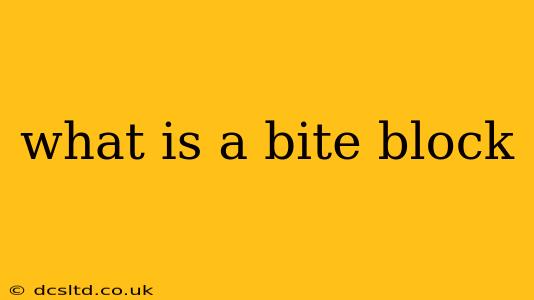A bite block is a simple yet crucial medical device used in various dental and medical procedures to keep a patient's mouth open and prevent them from biting down on instruments or injuring healthcare professionals. Its design and application vary depending on the specific procedure, but the core function remains consistent: safe and comfortable mouth opening. This guide will delve into the different types, uses, and considerations surrounding bite blocks.
What are the Different Types of Bite Blocks?
Bite blocks come in various forms, each designed to meet specific needs and situations. Some common types include:
-
Disposable Bite Blocks: These are single-use, often made from inexpensive materials like paper or foam. They are convenient, hygienic, and cost-effective, making them ideal for routine procedures.
-
Reusable Bite Blocks: Made from durable materials like plastic or metal, reusable bite blocks can be sterilized and used repeatedly. They are generally more expensive upfront but offer long-term cost savings.
-
Self-Retaining Bite Blocks: These blocks have mechanisms that allow them to remain firmly in place without requiring the assistance of a healthcare professional, thus maximizing efficiency during treatments.
-
Customizable Bite Blocks: In cases where a patient requires a unique shape or size, custom-made bite blocks can be created to ensure optimal comfort and stability.
What is a Bite Block Used For?
Bite blocks find applications across a wide range of medical and dental settings:
-
Dental Procedures: They are routinely used during dental procedures such as extractions, fillings, and root canals to prevent accidental biting of instruments or the patient's tongue. This protects both the patient and the dental professional.
-
Endotracheal Intubation: In emergency situations or surgeries, bite blocks help to maintain an open airway and protect the endotracheal tube during intubation. This is particularly crucial when a patient is unconscious or unable to control their jaw.
-
Oral and Maxillofacial Surgery: Bite blocks assist in maintaining the proper position of the jaw during complex oral and maxillofacial surgeries.
-
Other Medical Procedures: Although less common, bite blocks might be used in other medical procedures involving the oral cavity or requiring controlled mouth opening.
How is a Bite Block Used?
The application of a bite block depends largely on the type and the specific procedure. Generally, a healthcare professional gently inserts the block between the patient's upper and lower molars, ensuring a comfortable and secure fit. For self-retaining blocks, the instructions provided by the manufacturer should be followed carefully.
Are There Any Risks or Complications Associated with Using a Bite Block?
While generally safe, some potential risks associated with bite block use include:
-
Discomfort or Injury: Improper placement or an ill-fitting bite block can cause discomfort or even injury to the patient's gums, teeth, or jaw.
-
Aspiration: In the case of unconscious patients, there's a slight risk of aspiration if the bite block isn't properly secured.
-
Allergic Reactions: In rare cases, patients might have allergic reactions to the materials used in the bite block.
What are Some Alternatives to Bite Blocks?
While bite blocks are the most common method for maintaining mouth opening, alternatives exist:
-
Mouth Props: These are similar to bite blocks but often offer more adjustability.
-
Manual Restraint: In some situations, a healthcare professional might manually hold the patient's mouth open, although this is less efficient and can be tiring.
Is it Painful to Use a Bite Block?
The experience of using a bite block varies from person to person. Generally, a properly placed bite block should not cause significant pain. However, some discomfort is possible, particularly during prolonged procedures.
What Material is a Bite Block Made Of?
Bite blocks can be manufactured from various materials, including disposable paper, foam, durable plastics, and even metal for reusable options. The choice of material depends on the intended use and the desired level of durability.
This comprehensive guide provides a thorough understanding of bite blocks, their applications, and associated considerations. Always consult with a qualified healthcare professional for any concerns related to their use.
